Ostrich Racing, Arizona
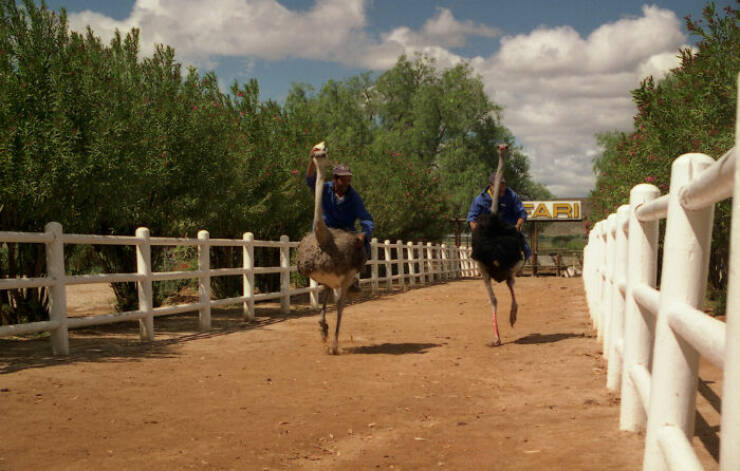
Ostriches are interesting animals, sometimes thought of as being horses with wings and attitudes. When ostriches were originally introduced to the US in the 1880s, ostrich-riding competitions erupted in several states across the nation. The largest current race was held in 2019 at the Chandler Ostrich Festival in Arizona.
Cherry Pit Spitting, Michigan

The International Cherry Pit Spitting Championship, hosted at the Tree-Mendus Fruit Farm in Michigan, celebrated its 46th anniversary in 2019. Eat the cherry and spit the pit as far as you can is all there is to it. It is not permitted for contestants to “pop” their cheeks with their hands, and no props or other items are permitted.
The Puck Fair, Ireland

The small town of Killorglin, which hosts Ireland’s oldest and oddest festival, is located deep within one of the country’s most renowned landscapes. A wild male goat called a “puck”, who is crowned monarch of the town for three days during this ancient festival, becomes King Puck. He is positioned in a tall cage in the town square where he can observe everyone.
Shoving Faces In Cake In Mexico

While celebrating a birthday with a cake is normal every year, due to the importance of the occasion, smashing a face into the cake is quite weird. In Mexico, as a way of marking the celebration, the celebrating person has their hands tied behind them and as they go for the first bite, they get pushed into the cake while hearing “Mordida! Mordida! Mordida!” being yelled at them. One can’t forget, Mexico produces quite creamy cakes.
There’s An International Hair Freezing Contest In Yukon, Canada

While others despise the winter season and drive it away, people from Yukon, Canada, celebrate this season in a freezing way: dunking their heads into hot springs and waiting for their hair to freeze over, and icicles to form. With temperatures reaching -30 Celsius, it is one of the weirdest, but coolest, traditions.
In Gloucestershire, England, People Gather To Roll Cheese Down A Hill

With Spring being the season of rebirth, when nature begins to show itself once more, it’s normal for people to celebrate. In Gloucestershire, England, locals and visitors gather around to roll cheese down a steep and grass-field-covered hill and chase them. While dangerous to the participants, it still attracts plenty of people each May.
Castrillo De Murcia In Spain Has A Baby Jumping Festival
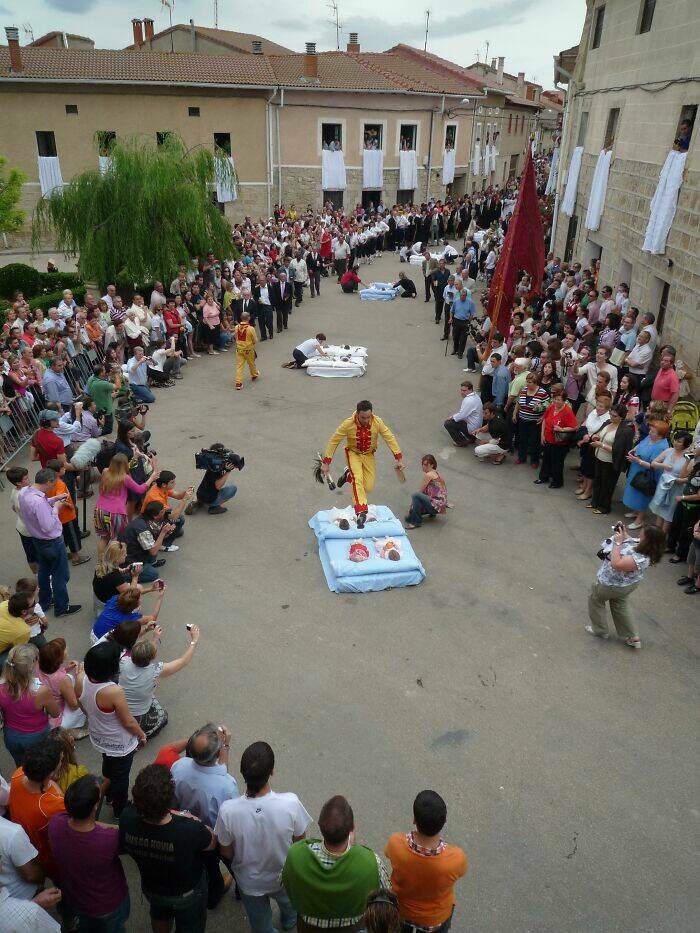
Some cultures view a child’s birth as a gift not only to the nation but also to the culture overall, a new member to celebrate. To prepare them for the future, in Castrillo De Murcia, Spain, local people bless the babies born the previous year by allowing a “devil” to jump over them. With no injuries reported, it is a tradition that dates back to the 1600s.
Polterabend In Germany

To add to the previously mentioned wedding traditions, Germany added a little bit of spice to the traditional way weddings are conducted. The day before the wedding is to happen, friends and family gather to smash different things on the floor of the happy couple. From plates to flowerpots, there are few things that are safe from destruction. After the mess is made, the soon-to-be newlywed couple clean everything up, setting a strong foundation for their future.
In Lopburi, Thailand, The Residents Prepare An Annual Feast For The Local Monkeys

Humans are part of nature so it is important to include a bit of the natural aspect into your tradition. Lopburi, Thailand has the tradition of preparing some food for the local monkeys that surround the town. From watermelons to lettuce and more, it is done to bring good luck not only to the people but also to gain favor from the monkeys who bring that luck to the region.
Boot Tossing, Finland

No one can debate that shoes have to be worn on the feet, but the Finnish have a unique way of using their shoes for the sake of tradition. The title of oddest sport belongs to Finland. Boot tossing has been practiced for generations, just like wife carrying.
Oaxaca, Mexico, Has A Massive Radish-Carving Festival During The Holiday Season

Radishes – we grow them in our gardens and most often buy them at the store when the appetite arises. In Oaxaca, Mexico, the radish-carving tradition dates back more than 120 years. Local people carve out figures and statues from the radishes they grow and display them to other locals and visitors of the region.
“Partita A Scacchi”, Marostica, Italy
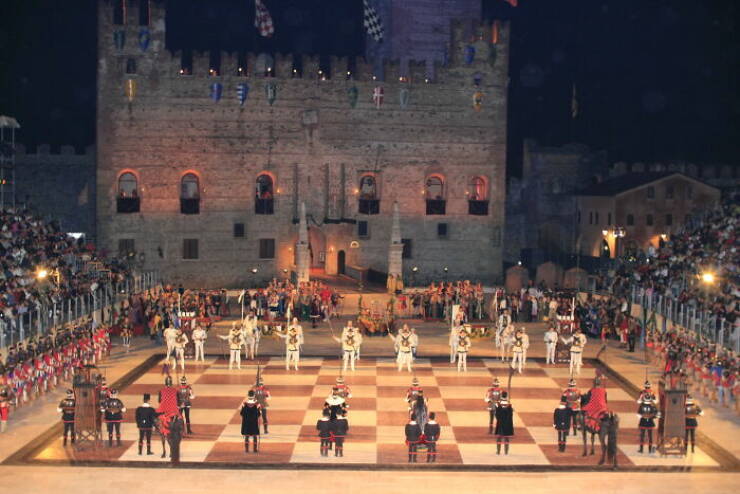
Chess is a game of strategy and thinking, making it quite boring to some people. The northern Italian town of Marostica is extremely delighted to host a human chess game every two years in September. The custom has its roots in a narrative from the fifteenth century. A product of a love triangle, it is one of the most fun traditions to partake in.
Midsummer Day, Lithuania
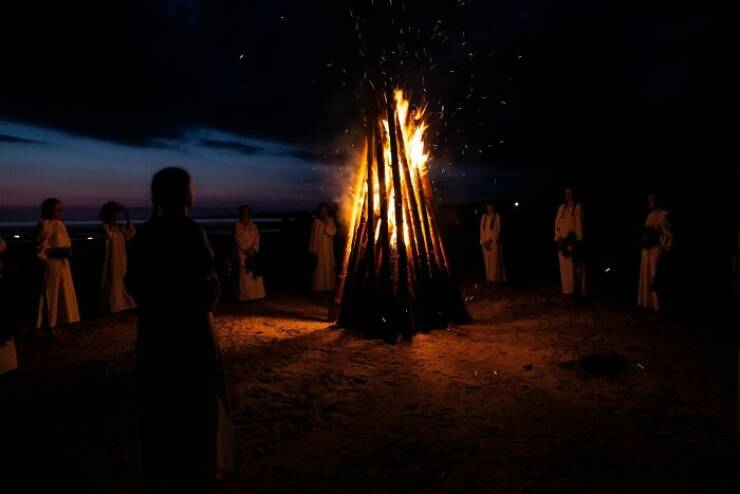
Lithuanians celebrate the warm season of summer with the day of Midsummer. During this day, young women must only wash their cheeks with fresh dew in the morning. Later in the evening, people gather around bonfires in the countryside and around the cities to make wishes and cast spell bags into the water to bring their desires to pass. Young couples also visit rural areas to look for fern blooms.
A Groundhog Predicts How Long Winter Will Last In The United States
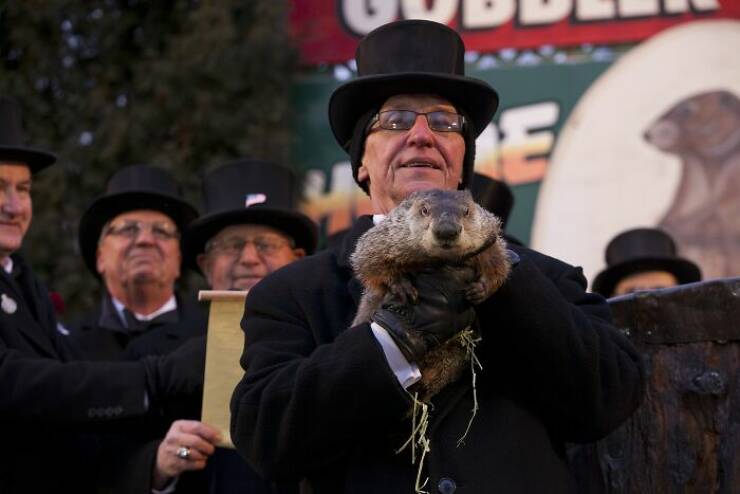
Predicting the future is hard for people, no one can do it with 100 percent accuracy, but animals are more predictable. In the United States, groundhogs are said to predict the future of the winter season’s end – if it’s going to stay a bit longer, most often six weeks, or if it’s going to give way for the upcoming spring. If the ceremonial hog sees a shadow, you’re going to have to wait a bit longer for the warm weather.
If You’re Not Married On Your 25th Birthday, In Denmark You Might Be Doused In Cinnamon

With Denmark being on the straits separating the Atlantic Ocean and the Baltic sea, it was only normal that some amenities from the west would come there. The Danish adopted the spices into their tradition as a way to play a funny joke on the people. If you are not married by the time you’re 25, expect some cinnamon to be thrown at you. If you are over 30, be ready for some black pepper to be thrown too.
Stonehaven, Scotland Celebrates New Year’s With Literal Balls Of Fire
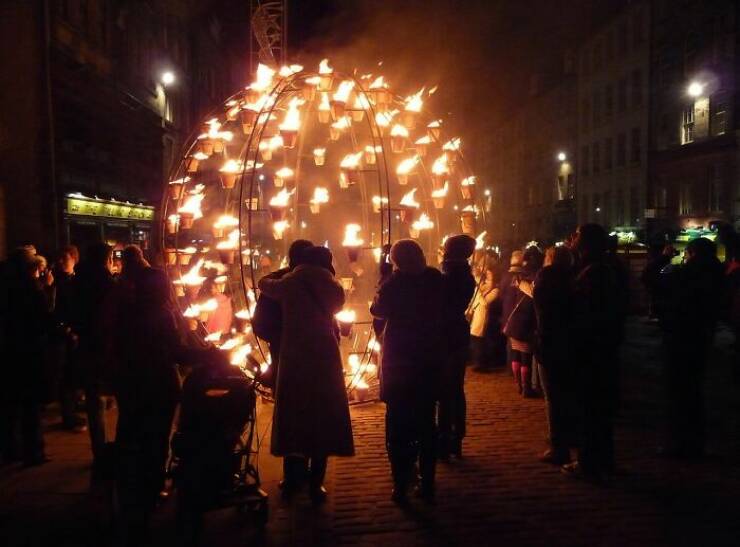
While firework shooting has become the main tradition that everyone partakes in around the world, Stonehaven, Scotland has also integrated literal balls of fire into their celebrations. People gather around and swing blazing fireballs around to celebrate the occasion. It is said that this tradition dates back to the old age of the Vikings.
The Battle Of Rockets (Rouketopolemos), Greece
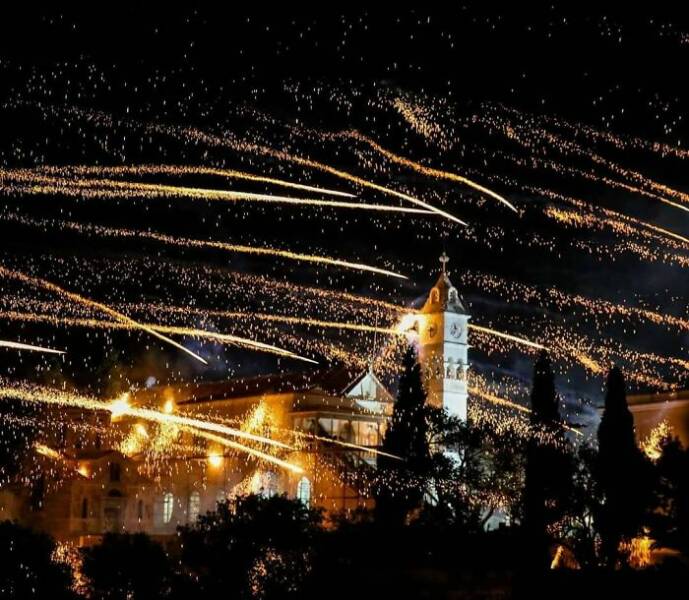
In a little hamlet called Vrontados on the Greek island of Chios, two churches stand across from one another in a ravine. Then on Easter, opposing members try to use rockets to ring the bell of the rival church. The winner is reportedly determined by counting direct hits on each belfry the following day, yet each parish consistently asserts victory.
The Frog Dance (Små Grodorna), Sweden

Don’t worry if you’ve seen Midsommar, the scary horror movie with a Swedish setting. If you decide to visit Sweden during their midsummer solstice events, there won’t be anything similar. To the pace of upbeat music, players dance around a maypole while hopping like frogs and using motions that depict body regions that frogs lack.
Festival Of Scrambled Eggs In Bosnia

Eggs are one of the most popular foods to eat in the world. It’s a universal food which perfectly combines with many other foods. But Zenica, Bosnia has taken it a step further. To welcome the spring season, local people cook scrambled eggs in the morning and spend the rest of the day on leisure activities, relaxing and partying all around.
Battle Of The Oranges In Italy

In Ivrea, Italy, every year, something very odd happens during the three days before Mardi Gras. The locals split into nine distinct squads, wear war gear, and over the course of several days, throw oranges at one another in an effort to eliminate the other teams. This game’s ancestry is unknown.
Caber Toss, Scotland, UK

With sports being a way of improving oneself, it is not so uncommon to celebrate strength by showcasing it to other people. The traditional Scottish athletic contest involves men wearing kilts tossing a big pole called a caber, and it is practiced at the Scottish Highland Games. In contrast to modern sports, tossing is more about the position the pole lands in than it is about how far it travels. The pole must be thrown with its thinner end facing away from the tosser and land flat on the ground with its larger end.
Bathtub Regatta, Belgium

Water is a vital part of our existence. It keeps us clean, away from thirst, and sometimes even entertained. The beginnings of this one-kilometer-long race along the River Meuse in Dinant, Belgium, can be traced back to 1982. The floating device’s use of a bathtub is one of the requirements for succeeding against up to 49 other competitors. It is encouraged to decorate the bathtubs.
The Giant Omelette (Omelette Géante), France

The inhabitants of the Southern French city of Bessières have a unique tradition to welcome spring: one day after Easter festivities, they prepare a massive omelet composed of more than 4,500 eggs that can feed up to 1,000 people in the town’s central plaza. Existing since Napoleon’s times, according to legend, Napoleon did the most to make this festival come to reality by ordering a large omelet to be made.
The Sausage Tossing (Eis-Zwei-Geissebei), Switzerland
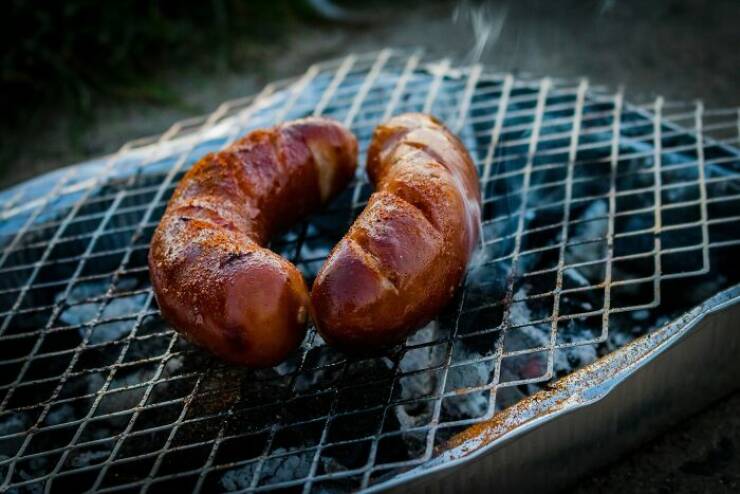
On Shrove Tuesday at precisely 3:15 pm, a large crowd of kids and adults congregate in front of Rapperswil’s city hall. When the mayor asks, “Are all my guys here?” the children yell out, “One, two, goat leg!” loudly and clearly. The mayor and council members then throw sausages, loaves of bread, and pastries into the throng after opening the windows.
The Wife Carrying Race (Eukonkanto), Finland

To test their strength, Finnish men participate in the sport contest known as “wife-carrying”. The history of this contest in Finland is a little murky, originating in the 19th century, when a thief was alleged to have carried all he stole on his back, including the women.
The Danube Race For The Cross (Plivanje Za Casni Krst), Romania

One of the strangest customs in Europe is practiced by the Romanians: a young guy swims in the icy river while a hundred or more spectators watch an Orthodox priest toss a cross into the water. It probably helps that everyone drinks homemade vodka before the occasion. If you can return the cross to safety, you will experience luck for a full year.
The Russ Celebrations (Russefeiring), Norway

Norwegian high school students regularly observe Russefeiring during their last spring semester. Participants in this celebration drive similar cars, vans, and buses, wear colored overalls — often red — and party nonstop for two weeks. Authorities prepare themselves every year for ongoing public intoxication and unrest during the holiday.
The National Hollerin’ Contest, North Carolina

Phones are rather a new invention, so hollerin’ is still not a forgotten art in our society, especially in the USA. Hollerin’ was a highly developed method of communication over great distances that was particularly well-liked in the American Southeast. It is a combination between a yodel and a hunting cry. The National Hollerin’ Contest was established in 1969 in Spivey’s Corner, North Carolina, to carry on this fun custom, and it has continued every year since.
Famadihana

Funerals are a sad occasion, but sometimes, there can be happiness seen in it. A tribe in Madagascar known as the Malagasy practices a burial custom called famadihana. To honor the deceased’s life, this tradition entails dancing with their bodies. People dance with their bodies as they are removed from the grave, rewrapped in new fabric, and then carried. One of these ceremonies is carried out every seven years.
Congratulating The Entire Family On One Person’s Birthday, Netherlands

Sometimes, the birthday is a celebration not of the person who is turning a year older, but of the entire family, who support the birthday boy or girl. It’s customary in the Netherlands to celebrate birthdays by giving well wishes to the celebrant’s family members as well as the actual birthday boy or girl.
Presidential Turkey Pardons

While Thanksgiving is celebrated by a few in Europe, it is a vital celebration in the United States. Since the 1940s, US presidents have received a Thanksgiving turkey at a formal ceremony and, on rare occasions, have formally pardoned the bird to save its life. And if you’re asking whether this ceremony has a deeper significance or symbolic meaning, the answer is no.
Nenana Ice Classic, Alaska

The last frontier and the icebox of the USA, Alaska is probably one of the coldest places on earth. So there will most certainly be a tradition relating to Alaska’s coldness. In one town in this state, people bet on when the river ice will break and a tripod is placed on the ice to track the time. When the ice eventually breaks, the winner gets quite a pool of prize money.
Coal Walking In China

Throughout the world, babies are born, but China places a unique emphasis on this event. The arrival of a newborn is surrounded by numerous customs and rules. The strangest custom involves the husband carrying the pregnant woman over hot coal before they enter their home. Naturally, he must perform it without shoes.
Every Year, The Czechs Have A Witch-Burning Festival To Ward Off The Evils Of Winter

While some during the winter season build snowmen and such to celebrate it, the Czechs seem to hate this season with a burning passion. Literally. They construct straw and hay witches, which represent the winter season, and burn them to ward off winter and the cold weather. And some would say that it works every time!
Baby Tossing In India

The child’s safety must be secured every second, but in India, it is customary to toss infants off the sides of temples as part of a rite. It is customary to bring your newborn back to the 50-foot-tall Sri Santeswar temple in India after getting married there and toss your child onto a cloth that is being held by both Muslims and Hindus below.
The Maypole (Maibaum), Austria

Austria, like Germany, is not a stranger to weird traditions. On May 1st, Austrians typically erect and protect their maypoles, while the nearby rival village, as part of the tradition, try to steal them overnight. The rivals will usually steal only the decently portable ones, even though most of the maypoles will be protected against such possibilities.
Flag Throwing In Tuscany, Italy
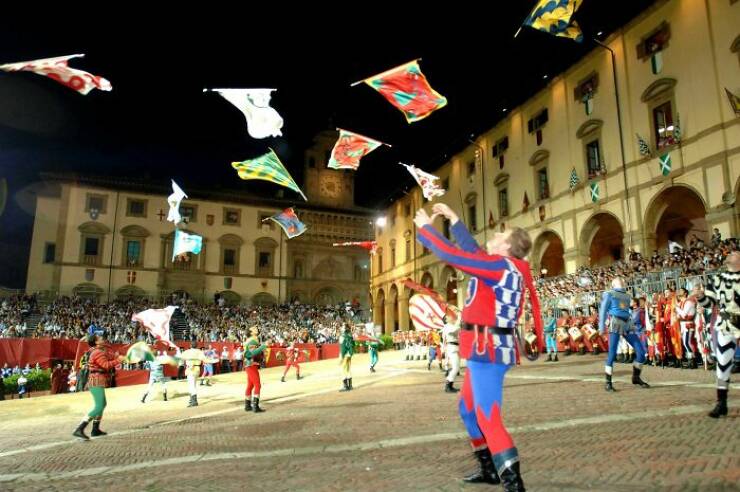
Although the Tuscan region is known for its wine, olives, pasta, and Tuscan sun, flag-throwing is a particularly significant custom. Young men and women conduct synchronized flag tossing and catching acrobatic displays during festivals today, continuing this ancient tradition — a stunning sight to behold while visiting Tuscany!
Source: www.boredpanda.com
 Barnorama All Fun In The Barn
Barnorama All Fun In The Barn